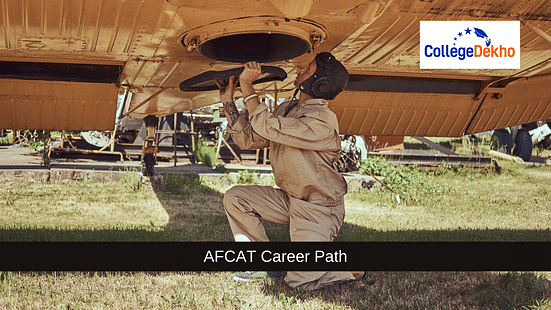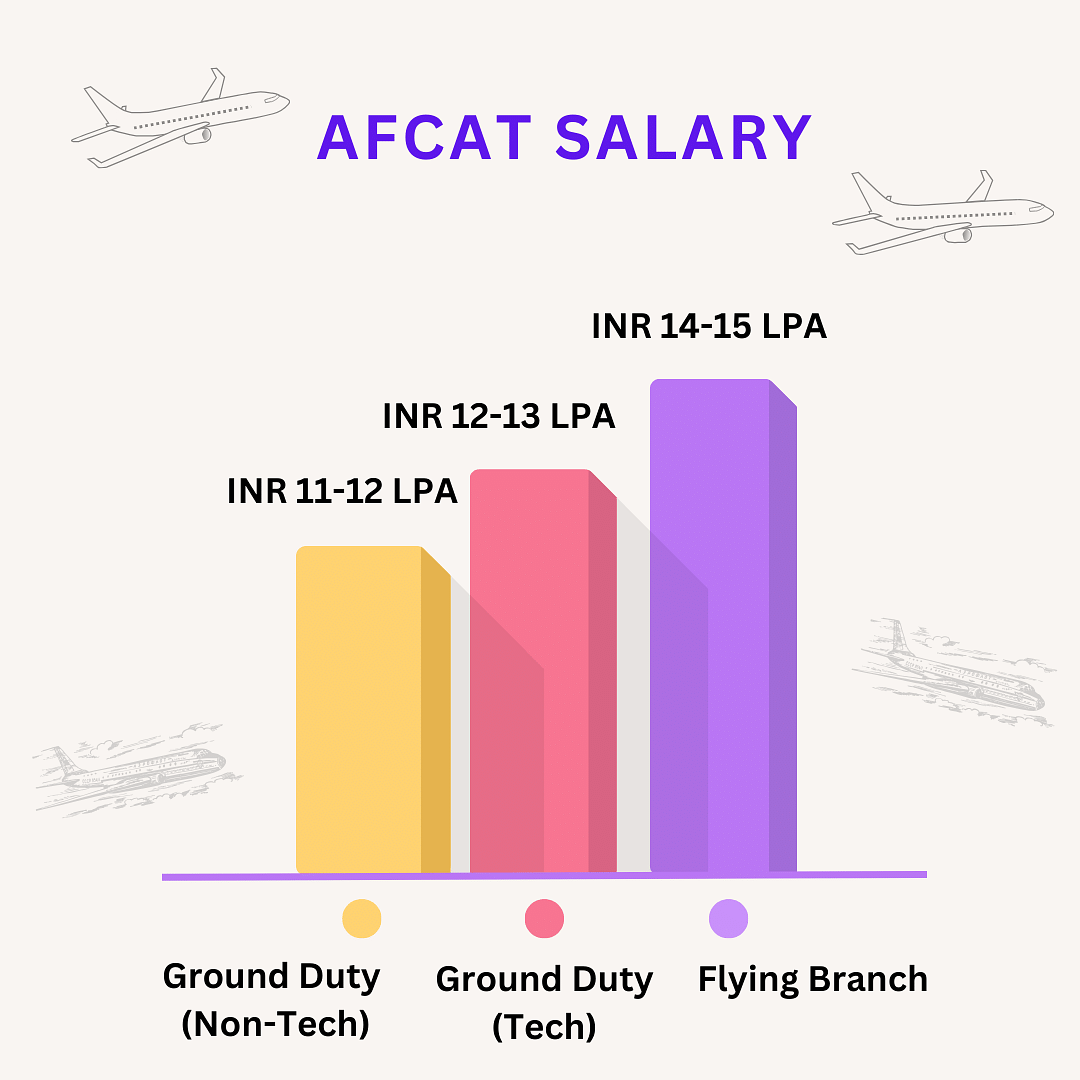
AFCAT Career Path: With the motto of “Touch the sky with Glory”, making a career in the Indian Air Force is every student’s dream. The Indian Air Force conducts the Air Force Common Admission Test (AFCAT) twice a year for students. Candidates who want to make a career can apply for the AFCAT entrance exam. Students can opt for the different AFCAT career paths according to their education level. AFCAT opens the door to the patriotism, honour, adventure, and passion of the students in the Indian Air Force. Once a candidate becomes a part of the Indian Air Force family, they can serve the Air Force as well as avail of the facilities and benefits.
When completing the AFCAT 2024 application form , applicants must specify their preferred branches to join after the AFCAT selection process . Candidates need to achieve a high score on the written test to receive an invitation for the Air Force Selection Board (AFSB) interview . During this stage, they can select their preferred AFSB location and interview date. To become part of the Air Force, candidates must receive a recommendation from one of the selection boards and pass a medical examination.
If you are looking to make a career in the Indian Air Force, then read the article to know the AFCAT career paths, eligibility, salary, job profiles, and other things.
Also Read:
AFCAT Career Path: Quick Overview
Students who want to make a career in AFCAT should know the important things about the exam. Here are the basic details of the AFCAT entrance exam.
AFCAT Career Path Overview | |
|---|---|
Exam Name | Air Force Common Admission Test |
Exam Level | National Level |
Conducting Body | Indian Air Force |
Exam Purpose | To select candidates for Flying Branch and Ground Duty in Indian Air Force |
Frequency | Twice a year |
Exam Mode | Online Mode |
Various AFCAT Career Paths
The Air Force offers a variety of opportunities to make a career in AFCAT. It is a very exciting career to pursue which offers great opportunities and future prospects. If you are someone who has the zeal to serve the country with an adrenaline rush, this career is the right fit for you.
Indian Air Force offers job opportunities in both technical and non-technical branches through the AFCAT exam. Here is the list of AFCAT career paths.
Career Path 1: After Graduation
Indian Air Force grants various opportunities to both Men and Women candidates to make a career through the AFCAT exam. Candidates who are already graduates and willing to make a career can appear in the AFCAT exam. Once the candidates pass the entrance exam, they will be required to appear in the training and interview process at Air Force Academy.
Career Path 2: After Engineering
Students who have completed their Engineering graduation can make a career through AFCAT. Indian Air Force calls for enthusiastic candidates and engineers to handle the engineering department. Candidates can apply for the AFCAT application and CDS exams to make a career through the AFCAT after Engineering.
Career Path 3: After Post Graduation
Candidates can also make a career through AFCAT and this includes both male and female candidates between the age of 20-24 years. Students can work for the Indian Air Force after post-graduation through the AFCAT exam.
AFCAT Career Path: Educational Qualification
The education qualifications and eligibility criteria for AFCAT 2024 depend on the branch you are applying for. The Flying branch and ground duty branch (Technical and non-technical) have different qualification requirements. The AFCAT branch-wise educational qualification is given below:
Flying Branch AFCAT Qualification:
- Candidates who are applying for Flying Branch must have passed with a minimum of 60% marks in the 12th class. The students must have Maths and Physics as compulsory subjects in the 12th class.
- Students must have a graduate degree in BE/BTech or cleared section A and B exams of Associate Membership of the Institution of Engineers (India) or Aeronautical Society of India.
Technical Ground Duty AFCAT Qualification
- Students must have completed 4 years of graduation degree in Engineering or integrated post-graduation in Engineering/ Technology from a recognised university.
OR
- Candidates must have cleared Sections A and B examination of Associate Membership of the Institution of Engineers (India) or Aeronautical Society of India or the Graduate membership examination of the Institution of Electronics and Telecommunication Engineers.
- Students must have passed the 12th class from a recognized board with a minimum of 60%.
Non-Technical Ground Duty AFCAT Qualification
- Candidates who are applying for the non-technical branches through AFCAT must have completed graduation such as LLB, BSc, MCA, etc.
- Students must not have any backlog while applying for the AFCAT exam. Final-year students are also eligible to apply for the AFCAT exam.
- Candidates must have passed the 12th class from a recognized board with 60% marks.
AFCAT Career Path: Required Skills
The Air Force is a field where heroes belong. To make a career in the Air Force through AFCAT, there are some required skills in a candidate. Being extremely bright students, the candidates should be able to lead. They also require the ability to motivate yourself and others in their time of need. Here are some skills mentioned below that an AFCAT aspirant should possess.
Skills Required for AFCAT Career Path | |
|---|---|
Leadership | Motivativating and Inspiring nature |
Decision Maker | Management skills |
Teamwork | Communication skills |
Strategic Mind | Confident |
Dynamic thinking | Quick Learner |
AFCAT Career Path: Career Opportunities
Candidates can make a career in the Air Force through AFCAT, and there are various career opportunities for the students. Candidates can make a career in the Flying Branch, Technical Branch, and Non-Technical Branch according to their interests and educational qualifications. The career options in the AFCAT career path are mentioned below.
Career in Flying Branch
The candidates can make a career in Flying Branch in different departments, which include:
- Fighters
- Transports
- Helicopters
Career in Technical Ground Duty
Students who have graduated in Engineering can opt for the Technical duties, which are:
- Mechanical
- Electronics
Career in Non-Technical Ground Duty
Students who want to make a career in the Air Force through a non-technical branch can opt for different departments according to their educational qualifications. The departments for the non-technical branch are:
- Weapon Systems
- Administration
- Accounts
- Logistics
- Education
- Meteorology
AFCAT Career Path: Job Profile
The AFCAT provides students with different job profiles depending on their interests. The table shows the job profile for various branches of IAF:
Branch | Description |
|---|---|
AFCAT Flying Branch |
|
AFCAT Ground Duty (Technical) |
|
AFCAT Ground Duty (Non-Technical) |
|
AFCAT Career Path: Salary
After students qualify AFCAT they are given training depending on the role. The aspirants are offered a stipend of INR 56,100 per month during the complete training period. After completion of the training, the candidate's salary is fixed in the first cell of Level 10. Each Indian Air Force branch receives a different salary.

Check below the annual package of each department:
Branch | Average Salary Package Per Annum (In INR) | Average Salary Per Month (In INR) |
|---|---|---|
Flying Branch | 14,00,000 -15,00,000 | 1,08,000 |
Ground Duty (Tech) | 12,00,000-13,00,000 | 95,262 |
Ground Duty (Non-Tech) | 11,00,000-12,00,000 | 85,262 |
However, with experience and performance, candidates gain promotion to higher positions. If a candidate has worked as a Flying Officer for three years, they will be further promoted to Flight Lieutenant. Also, to secure a promotion within the department, students have to appear for departmental tests. To be eligible for a departmental promotion the officer-ranked candidates have to sit for C examinations. The C examination syllabus includes General Knowledge and post-related topics for departmental promotion and for securing promotion in ranks.
Read More: AFCAT Salary 2024
AFCAT Career Path: Perks and Additional Benefits
Beyond their title, AFCAT officers enjoy attractive salary packages and a range of facilities. Their compensation includes allowances for housing, transportation, and daily meals, contributing to an improved quality of life. The government ensures comprehensive medical benefits for AFCAT officers, prioritizing their health and fitness for service.
The AFCAT career path offers officers opportunities for advancement within the Indian Air Force. The IAF organizes various training programs to enhance officers' knowledge and skills, serving as a motivational factor. Additionally, AFCAT officers are eligible for a pension plan upon retirement, ensuring a comfortable life beyond their tenure in the Air Force. Explore the perks and benefits offered to officers in the Indian Air Force below.
Particulars | Details |
|---|---|
Educational Benefits |
|
Scholarships and Welfare |
|
Insurance |
|
Loan facility |
|
Placement cell |
|
Medical Allowances |
|
Post-retirement Benefits |
|
Other benefits |
|
Read More: AFCAT Physical and Medical Standards
With variable perks and benefits, students who choose to build a career in the Air Force must start gearing up from the day they decide to go for this career path. Hope this article helps you realise that whatever you have chosen, must be out of your interest.
Stay tuned with
CollegeDekho
for more updates about the AFCAT exam!

















Similar Articles
How to Become a Ground Duty Officer in the IAF?
AFCAT Selection Process for Ground Duty Non-Technical
Dress Code for AFCAT Exam Day
Dos and Don’ts for AFCAT 2024
AFCAT Question Paper: Exam Pattern, Paper Analysis, Difficulty Level, Sample
How to Prepare for AFCAT AFSB Interview: Preparation Strategy and Important Tips